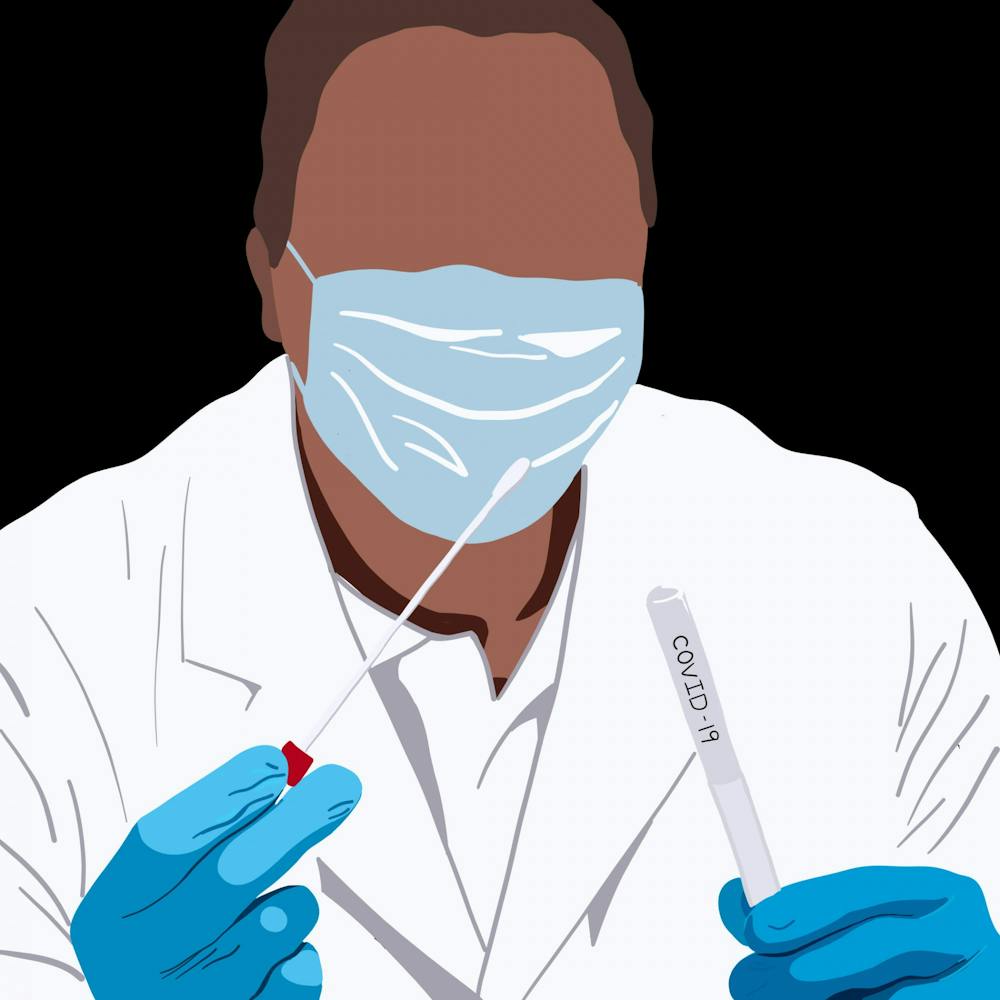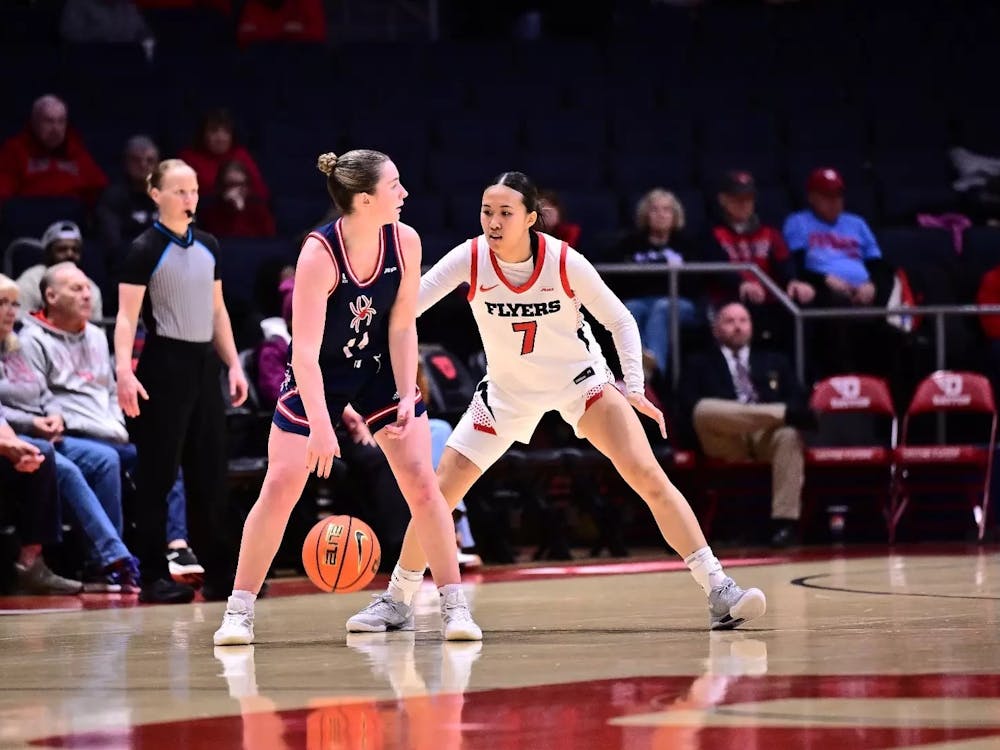Almost a year to the day when University of Richmond suspended classes because of the COVID-19 pandemic, Adrienne Piazza, associate director of the Bonner Center for Civic Engagement, arrived at the Richmond Raceway to receive her first dose of the Pfizer COVID-19 vaccine.
“For me, at least, it was actually very overwhelming because it’s like the beginning of the end in this moment, right,” Piazza said, referring to getting the vaccine. “We’ve been preparing for this moment for so long.”
The Richmond Raceway now serves as one of Richmond’s vaccination sites. Piazza received her first vaccine dose on March 12, after pre-registering in February through the Virginia Department of Health.
“I got an email on a Thursday afternoon that was like ‘It’s your turn. You’re eligible now,’” Piazza said. “And I kind of held my breath and clicked through the links and then there were available appointments for the next morning. So it happened really quickly for me in terms of telling me it’s my turn and then getting the shot.”
Some UR faculty, staff and students have been able to receive COVID-19 vaccinations under the Virginia Department of Health’s phased vaccination rollout.
Central Virginia, including the Henrico County and Richmond City health districts, is currently in Phase 1b, which means people who qualify for the vaccine include frontline essential workers, people 65 years and older, people 16 through 64 years old with a high-risk medical condition or disability that increases their risk of severe illness from COVID-19, and people living in correctional facilities, homeless shelters and migrant labor camps.
Vaccinations for those who qualify for the vaccine under Phase 1a, including healthcare workers and residents of long-term care facilities, are continuing as well.
Faculty and staff of institutions of higher education are eligible to receive the vaccine under phase 1c, which the VDH announced health districts could begin transitioning to on March 16 with the condition that “before moving to 1c, local health departments must have made strong efforts to reach all those eligible in 1a and 1b populations,” according to the announcement.
All communities in Virginia are expected to move into phase 1c by mid-April, according to the VDH.
Although Piazza’s process to get the vaccine was straightforward, she said, she noted that there has been confusion among her peers about how to navigate pre-registration and vaccination appointments.
“I think the information has been confusing because it’s a whole new set of language that we weren’t using six months ago,” Piazza said. “So, why am I getting an email from the CDC [Centers for Disease Control and Prevention]; what is VAMS [Vaccine Administration Management System]; and what is the VDH; and what is the city health district? And so I think it’s a hierarchy and structure that is not one that we’ve had to navigate as individuals before.”
Piazza scheduled to receive the second dose of the Pfizer vaccine in April, she said.
Enjoy what you're reading?
Signup for our newsletter
Piazza believes she qualified to receive the vaccine because of an underlying health condition but said she had not been told why she qualified. She did not have to bring any medical documents to her vaccination appointment, she said.
Some UR students have received COVID-19 vaccines as well.
Junior Nicole Vazquez also received her first dose of the vaccine at the Richmond Raceway on March 12. She also believes she qualified for the vaccine because of an underlying health condition but mentioned that she also noted that she works at the gym at UR in her pre-registration form. She is also unsure which characteristic qualified her for the vaccine, she said.
“I pre-registered pretty early, about a month before I actually got it,” she said.
She had been nervous about having to wait in long lines at her appointment because one of her friends had had to wait three hours before receiving the vaccine. But Vazquez’s vaccination experience, similar to Piazza’s, was quick and organized.
“I was in and out in like 10 minutes,” Vazquez said.
She filled out paperwork before arriving at the vaccination site, which she thinks streamlined her process. She has yet to schedule her second dose but will be eligible to receive her second dose starting April 5, she said.
Senior Liz Narwold is fully vaccinated and received her first dose of the two-dose Moderna vaccine in January because she works with UR Emergency Medical Services.
“Knowing that I personally will be safe really has lifted a weight off my shoulders,” Narwold said. “I also do respond to COVID-infected individuals as an EMT and so I feel much safer.”
Vaccinated people can potentially still contract COVID-19 and spread it to others, according to the CDC, so Narwold remains conscious of her interactions despite being fully vaccinated.
Narwold said she has noticed a change in how her peers at UR are getting vaccinated. While she pre-registered and was notified when she could schedule an appointment, many of her friends are taking a more active approach, she said.
“I know people are doing it in so many different ways, like one of my friends was just checking the Walgreens website over and over and over again," Narworld said.
Some of her friends took it upon themselves to find appointment openings at Walgreens locations in Virginia, rather than waiting to be contacted by VDH to get vaccinated at a health department vaccination site.
In addition to the health department, some primary care providers, local pharmacies and worksites are now offering the vaccine, such as Walmart, CVS and Kroger.
Narwold was the first of her friends at UR to get the vaccine, she said, but many of her friends in her home state of Connecticut were able to get vaccinated before her.
Vaccination rollout and eligibility schedules vary by state, but the CDC has provided recommendations to federal, state, and local governments about who should be vaccinated first. States create their own vaccination criteria, often based on age, underlying health conditions and profession.
Piazza, Vazquez and Narwold had varying intensities of side effects to the vaccine but all noted that effects subsided after a few days.
Vazquez had a headache and some soreness around the section of her arm where she got the vaccine shot.
“It hurt less than a flu shot, which is very surprising to me,” Vazquez said.
Narwold said she had a headache and fatigue after each dose of the Moderna vaccine but that these side effects were substantially worse after her second dose.
“It kind of knocked me out for the full day and part of the next day,” she said.
Piazza initially felt fine after receiving her first Pfizer dose, she said, but by the night of the day she received her first shot she felt fatigued. Her fatigue lasted through the following day.
“I didn’t have a fever; I didn’t really have a headache; I didn’t really have a stomach ache,” she said. “It was just a general achy feeling.”
Although the shot had worse side effects than Piazza expected, she was more surprised by the emotional reaction she had upon receiving her first dose, she said
“I think there’s also a bit of an adrenaline drop in that because while it initially doesn’t really change anything, it felt like this turning point moment,” Piazza said, “and so, the kind of anxiety and excitement to get it and then to come home … it all just felt more emotional in that sense too.”
Contact managing editor Emma Davis at emma.davis@richmond.edu.
Support independent student media
You can make a tax-deductible donation by clicking the button below, which takes you to our secure PayPal account. The page is set up to receive contributions in whatever amount you designate. We look forward to using the money we raise to further our mission of providing honest and accurate information to students, faculty, staff, alumni and others in the general public.
Donate Now



